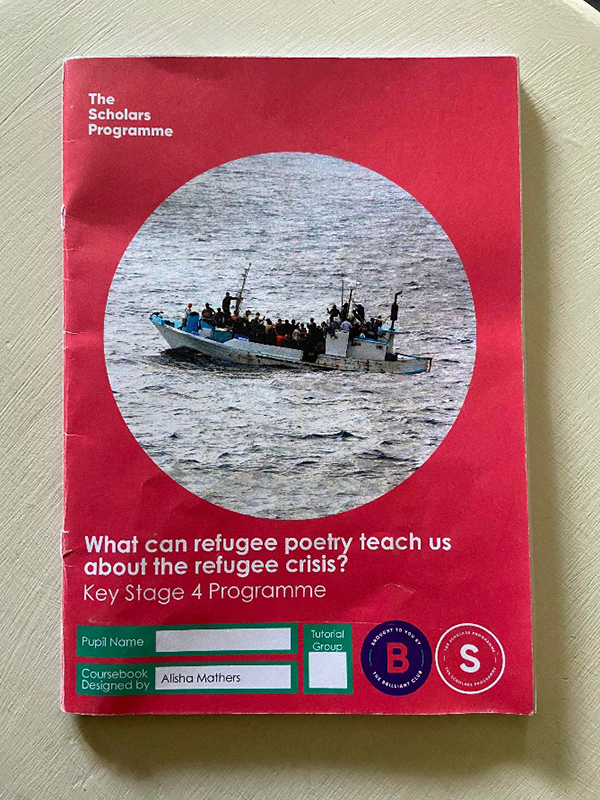
Alisha Mathers tells of her placements on the Brilliant Club’s Scholars Programme.
One of the most challenging yet vital aspects of any project is disseminating your research to others not only outside of your field but to other audiences beyond academia. While I had presented parts of my research in conferences outside of my subject, I had no experience in adapting my research to audiences outside of university. To gain experience in this area, I applied to do placements on the Brilliant Club’s Scholars Programme.
The programme is available to state school students and led by PhD students across disciplines who deliver a course designed on their own research project. The tutorials are aimed to challenge pupils to enhance their knowledge of a subject and focus on ‘developing key university-preparedness skills’ (The Brilliant Club) such as planning assessments, doing independent research, and participating in seminar-style discussions.
As my thesis examines representations of refugee homemaking practices in the UK in contemporary narratives such as plays, cookbooks and poetry challenge dominant depictions of refugees in the news media, my course asked the big question:
‘What can refugee poetry teach us about the refugee crisis?
In the course, students learned about the ongoing refugee crisis, and how poetry can help us to better understand the refugee experience around the world, specifically through refugee poetry from Warsan Shire, Benjamin Zephaniah, and JJ Bola.
Overall, the course aimed to teach students about the value of the Arts and Humanities in critically exploring major issues in the world today. At the end of the course students gained a greater understanding of the power of poetry; specifically understanding how refugee poetry can:
- tell important stories that can help others understand refugee experiences
- challenge problematic depictions of refugees in the media
- go on to shape policies that improve the treatment of refugees worldwide
In one tutorial, students were presented with a carousel of UK newspaper headlines all about refugees from over the last 20 years. The students were tasked with spotting vocabulary that presents refugees in a bad or good light which they then use to contribute to the class discussion on the power of representation in the media. This activity encouraged students to use contextual evidence to support their arguments, therefore, helping them to enhance their analytical skills.
Another part of the programme was to help pupils work on their academic skills, knowledge of university, and sense of belonging in academia. To introduce pupils to some important academic skills, I led sessions on plagiarism, finding good quality resources, and using the mark scheme to plan and write an assignment.
The Schools’ impact reports revealed that before the programme only 33% of students felt like ‘university is for people like me,’ so in line with the course’s focus on the power of representation and visibility, I told the pupils about my own journey as a first-generation student going from state-school to doctorate level. After the talk, I hosted a Q&A session on life at university which led to discussions on applying, funding, studying, moving away from home, and making friends in a new place.
After completing the programme 92% of students then agreed with the statement that university is for people like themselves.
An Impact Report from one school revealed that 92% of pupils agreed that they left the course with ‘a good level of knowledge in the subject that the Scholars Programme focused on,’ while another school’s report showed that 80% of pupils agreed with the statement. One student was quoted in the report stating:
‘I learned lots of new information in the Brilliant Club, I enjoyed learning new things that I did not know about refugees. I felt very comfortable with the tutor and had a fun time’ (TSP Impact Report 2021-22).
Being involved in the programme has challenged me to disseminate my research in more accessible and engaging ways. The experience encouraged me to always think about the ‘whys’ of my project (namely why is it important and why anyone should care about it) and helped me to consolidate my research to its main points.
Additionally, I am grateful to have been a part of the Scholars Programme which according to the independent report carried out by UCAS found that 56% of students who completed the Scholars Programme progressed to a competitive university compared to 37% from a matched control group (UCAS 2022).
Thank you to the SWW DTP and the Brilliant Club for supporting me in doing these challenging and fun placements.
Categorised in: Student Blogs